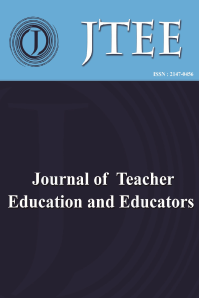Öğretmen Adaylarının ve Öğretmen Eğitimcilerinin Yabancı Dilde Dinleme Endişesi Üzerine Görüşleri
Dil öğrenmede dinleme becerisinin diğer beceriler üzerindeki yadsınamaz bir etkisi vardır ve bu sebeple dinleme becerisini etkileyen ve başarıyı engelleyen etmenleri incelemek gerekmektedir. Bu nitel çalışmada yarı yapılandırılmış görüşmeler yoluyla hem öğretmen adaylarının hem de öğretmen eğitimcilerinin yabancı dilde dinleme endişesi ile ilgili görüşleri incelenmiştir. Toplanan sözlü verinin analizi; öğretmen adaylarının ve öğretmen eğitimcilerinin yabancı dilde dinleme endişesi tanımı, bu endişenin sebepleri ve sonuçları ve de bununla baş etme yolları açısından benzer görüşler dile getirdiklerini ortaya koymuştur. Bu benzerlikler hem öğretmen adaylarının hem de öğretmen eğitimcilerinin problemin farklı boyutları ile ilgili bilgi sahibi olduklarını fakat bu bilginin öğretmen adaylarındaki endişe seviyesini indirmede çok etkili olmadığını göstermektedir. Daha düşük seviyelerde endişeyi sağlamak için yapılması gereken çok şey bulunmaktadır
Anahtar Kelimeler:
Yabancı dilde dinleme endişesi, yaygın dinleme, öğretmen adayları, öğretmen eğitimcileri, yabancı dil öğretmeni eğitimi
Student Teachers’ and Teacher Educators’ Views on Foreign Language Listening Anxiety1
As listening influences other skills in language learning, there is always a need to analyze factors influencing and/or preventing success in listening. In this qualitative study, both student teachers’ and teacher educators’ views on foreign language listening anxiety were analyzed with semi-structured interviews. The analysis of the verbal data revealed a lot of similarities between the stated views of student teachers’ and teacher educators’ in terms of how they defined foreign language listening anxiety, the causes and effects of it and their ways of dealing with it. These similarities suggest that both student teachers and teacher educators know about the different dimensions of the problem, but this does not contribute to lowering the anxiety of the student teachers to a great extent. There is still a lot we can do to achieve lower levels of foreign language listening anxiety
Keywords:
Foreign language listening anxiety, extensive listening, student teachers, teacher educators, foreign language teacher education,
___
- Akyel, A.S. (2012). Preservice English language teacher education in Turkey. In Y. Bayyurt & Y. Bektaş-Çetinkaya (Eds.), Research perspectives on teaching and learning English in Turkey (pp. 25-37). Frankfurt am Main: Peter Lang.
- Bekleyen, N. (2007). An investigation of English teacher candidates‟ problems related to listening skill. Electronic Journal of Social Sciences, 6(21), 91-105. Retrie- ved from http://www.esosder.org/eng
- Bekleyen, N. (2009). Helping teachers become better English students: Causes, ef- fects, and coping strategies for foreign language listening anxiety. System, 37, 664-675.
- Dörnyei, Z. (2007). Research methods in applied linguistics. Oxford: Oxford Univer- sity Press.
- Dunkel, P. (1991). Listening in the native and second/foreign language: Toward an investigation of research and practice. TESOL Quarterly, 25(3), 431-457.
- Elkhafaifi, H. (2005). Listening comprehension and anxiety in the Arabic language classroom.
- The Modern Language Journal, 89(2), 206-220.
- Gönen, M. (2009). The relationship between FL listening anxiety and FL listening strategies: The case of Turkish EFL learners. Proceedings of the 5th WSEAS/IASME International Conference on Educational Technologies, Spain, 44-49.
- Hasan, A. (2000). Learners‟ perceptions of listening comprehension problems. Langu- age, Culture and Curriculum 13, 137–153.
- Hatton, N., & Smith, D. (1995). Reflection in teacher education: Towards definition and implementation. Teaching and Teacher Education, 1(1), 33-49.
- Horwitz, E.K., Horwizt, M.B.,& Cope, J.A. (1986). Foreign language classroom anxi- ety. The Modern Language Journal, 70, 125-132.
- Innami, Y. (2006). The effects of test anxiety on listening test performance. System, 34, 317-340.
- Johnson, K.E. (2009). Second language teacher education: A sociocultural perspecti- ve. New York, NY: Routledge.
- Kim, J. (2005). The reliability and validity of a foreign language listening anxiety scale. Korean Journal of English Language and Linguistics, 5(2), 213-235.
- Kimura, H. (2008). Foreign language listening anxiety: Its dimensionality and group differences. JALT Journal, 30(2), 173-195.
- Kumaravadivelu, B. (2006). Understanding language teaching: From method to post method. New York, NY: Routledge.
- MacIntyre, P.D., & Gardner, R.C. (1989). Anxiety and second-language learning: Toward a theoretical clarification. Language Learning, 39(2), 251-275.
- MacIntyre, P.D., & Gardner, R.C. (1994). The subtle effects of language anxiety on cognitive processing in the second language. Language Learning, 44(2), 283- 305.
- Nation, I.S.P., & Newton, J. (2009). Teaching ESL/EFL listening and speaking. UK: Routlegde, Taylor & Francis.
- Ohata, K. (2005).Language anxiety from the teachers‟ perspective: Interviews with seven experienced ESL/EFL teachers. Journal of Language and Learning, 3(1), 133-155.
- Richards, J.C., & Rodgers, T.S. (2002). Approaches and methods in language teac- hing (2nd Ed.). New York, NY: Cambridge University Press.
- Rivers, M.W. (1981). Teaching foreign language skills. Chicago, IL: The University of Chicago Press.
- Vandergrift, L. (2007). Recent developments in second and foreign language listening comprehension research. Language Teaching, 40, 191-210.
- Vogely, A.J. (1998). Listening comprehension anxiety: Students‟ reported sources and solutions. Foreign Language Annals, 31(1), 67-80.
- Yaylı, D. (2009). Reflective practices of pre-service teachers in a listening skill course in an ELT department. Procedia Social and Behavioral Sciences, 1(1), 1820- 1824.
- Yüksekögretim Kurulu (YÖK). (2007). Egitim fakülteleri ögretmen yetistirme lisans programları. Ankara: Yüksekögretim Kurulu Başkanlığı.
- ISSN: 2147-0456
- Başlangıç: 2012
- Yayıncı: İlknur GÖKÇE
